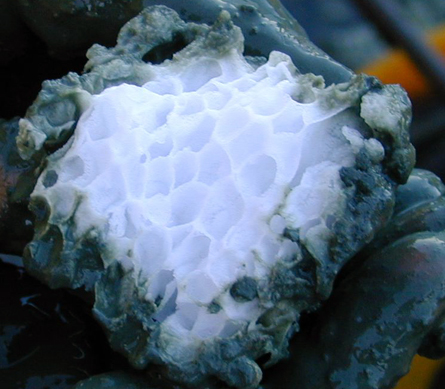While it’s no ice-nine, a frozen form of methane trapped in ocean sediments could be cause for concern. Warm Gulf Stream waters off the east coast of North America are converting large amounts of the substance into methane gas, which could lead to underwater landslides and influence global climate.

A good portion of the biological carbon on Earth is stored in the seafloor as methane hydrate, a frozen mixture of methane and water formed at high pressure and low temperature. Changes in the temperature or direction of the Gulf Stream, which carries warm water north from the Gulf of Mexico, have heated sediments in a strip along the North Atlantic seafloor by 8 degrees Celsius, unlocking 2.5 billion metric tons of methane from deep-sea caches, scientists report in the Oct. 25 Nature.
This is the first study to suggest that methane hydrate melting is related to ocean currents themselves, says study coauthor Benjamin Phrampus, an Earth scientist at Southern Methodist University in Dallas. Previous studies suggested that the global ocean temperature would have to increase to cause hydrate breakdown, which would take a very huge input of energy, he says. “We don’t need this large amount of energy to explain this. It’s simply a change in the ocean currents.”
In Kurt Vonnegut’s 1963 novel Cat’s Cradle, the fictional substance ice-nine crystallizes all liquid water it touches, with the power to wipe out all life on Earth in an instant. The conversion of methane hydrate to gas isn’t nearly so apocalyptic, though. While methane is a much more potent greenhouse gas than CO2, at the depths it’s being released most of the methane will never reach the atmosphere. Instead, it will dissolve in seawater, where microbes will guzzle it up and convert it to CO2. Even if methane does reach the surface, its lifetime in air is only about 10 years.
To affect global warming, “you’d have to add quite a bit of methane to the atmosphere to really move the needle much,” says geophysicist Carolyn Ruppel of the U.S. Geological Survey in Woods Hole, Mass. Where it becomes a problem, Ruppel says, is if sediments retain the methane gas, which could make underwater slopes much more prone to landslides. These slides might release even more methane from the seabed or trigger tsunamis.
Unstable hydrates may have caused the giant Cape Fear slide in this region of the North Atlantic, and similar ones could release an order of magnitude more gas than what’s already escaping.
Sudden methane hydrate release has been proposed as the cause of global warming events like the Paleocene-Eocene thermal maximum, a rapid spike in global temperature of more than 5 degrees Celsius that occurred about 55 million years ago. Compared with the PETM, the amount of gas being released by hydrates off of the U.S. east coast is very small, says Phrampus, but he notes that “it’s very unlikely that this is the only part of the world where it’s occurring.”
The study relied on indirect measurements of seafloor temperature to infer that hydrates are disintegrating. These methane solids can form only in the top few hundred meters of ocean sediments. Below that, the Earth’s warm interior keeps methane a gas. Seismic signals revealed the depth where solid hydrates met gassy methane. Comparing this depth with theoretical predictions suggested that the region was probably cooler in the past, but changes in the Gulf Stream 5,000 years ago are causing it to heat up.
It’s like seeing a block of ice on a warm, sunny day, says Earth scientist Gerald Dickens of Rice University in Houston: You can infer that the ice is melting even if you can’t see it. By similar logic, from rising sediment temperatures scientists suspect that a big chunk of the frozen methane must be vaporizing, even without observing it directly.
Methane hydrates will be breaking down over the next few centuries if the Gulf Stream doesn’t cool off or shift its position. Because scientists don’t know how much methane hydrate is out there or how much gas could be released, however, the impact on global climate remains unclear.
“I think we really have to keep an open mind on this right now,” Dickens says.







